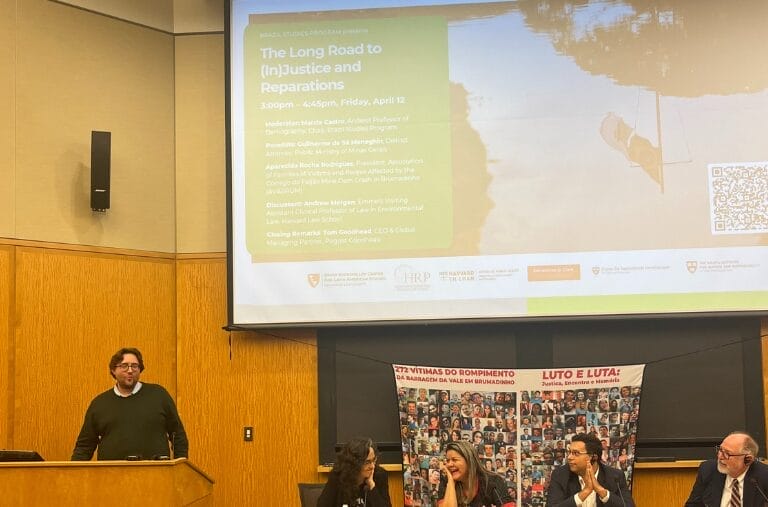In previous posts, the firm examined recent landmark climate change cases and litigation trends and the new European human rights and environmental due diligence legislative regime.
As these posts show, environmental litigation is on the rise as individuals and organisations seek to ensure corporations and governments uphold their environmental and human rights obligations. And the new landmark case of Australasian Centre for Corporate Responsibility (ACCR) v Santos Ltd, filed in the Federal Court of Australia on 25 August 2021, suggests this trend is set to continue.
ACCR v Santos Ltd
The Defendant, Santos Ltd, is one of Australia’s largest gas companies and the largest domestic supplier of natural gas.
According to ACCR, in 2019-20 Santos was responsible for approximately 7.74 million tonnes of carbon dioxide (CO2) equivalent emissions from its direct operations.[1]
Notwithstanding, ACCR alleges that Santos made statements in its 2020 Annual Report that:
i) Its natural gas is a ‘clean fuel’ and provides ‘clean energy’ (Clean Energy Representations)
ii) Santos has a credible pathway to net-zero GHG emissions by 2040 (Net-Zero Representations).
ACCR argues that these representations constitute misleading or deceptive conduct under section 1041H of the Corporations Act 2001 (Cth) and sections 18 and 33 of the Australian Consumer Law (ACL).[2]
Clean Energy Representations: ACCR asserts that these representations are misleading or deceptive in two material respects. First, the statements misrepresent the environmental impacts of natural gas and the by-products released in extraction and burning.
Second, Santos’ Annual Report fails to disclose that:
i) The extraction of natural gas releases significant volumes of CO2 and methane
ii) The end-use of natural gas releases material amounts of CO2
iii) Alternative energy sources which Santos does not produce are available that have neither of these effects.
Net-Zero Representations: ACCR alleges these representations are misleading because they:
i) Fail to disclose Santos’ plans to increase its GHG emissions by developing new LNG commitments
ii) Rely heavily upon undisclosed qualifications and assumptions about carbon capture and storage (CCS) processes and the production of ‘blue hydrogen’, the environmental impacts of which are still uncertain.[3]
Accordingly, ACCR seeks declaratory and injunctive relief, including an order requiring Santos to publish a corrective statement to shareholders.
What does ACCR v Santos mean for climate litigation in the UK?
Several key lessons relevant to the UK can be drawn from ACCR v Santos.
The first is that the breadth of UK climate litigation against private sector entities, particularly with respect to disinformation and greenwashing claims, will likely continue to expand.[4]
ACCR v Santos is the first case internationally to challenge the veracity of a company’s net-zero emissions target, the viability of CCS, and the environmental impacts of blue hydrogen.[5] If successful, it will no doubt motivate activists to investigate new legal avenues for bringing climate change litigation in the UK.
Net-zero commitments may themselves become a particular battleground as their adoption becomes more mainstream.[6] In the Milieudefensie v Shell case, discussed here, the Court emphasised the need for Shell to reduce both its direct and value chain emissions in confirming Shell’s responsibility to align its efforts with the 1.5°C temperature limit inscribed in the Paris Agreement and the related requirement to reach net-zero emissions by mid-century.[7] Similar cases to Milieudefensie v Shell have already commenced in France[8] and have been threatened in Germany.[9]
Second, ‘black letter’ causes of action may be deployed more regularly and creatively in UK climate change litigation. While the claims pursued in ACCR v Santos are statutory, section 18 of the ACL shares key commonalities with English common law and statutory claims in tort and contract for deceit, passing off and misrepresentation/misstatement.[10]
Common law claims for fraud and misrepresentation, as well as related statutory claims, have also been pursued against private sector entities in the US.[11] Recent commitments at COP26 by the Glasgow Financial Alliance for Net Zero to deliver as much as US$100tn of financing to help economies transition to net zero over the next three decades may likewise provide a future basis for similar disputes.[12]
Accordingly, in addition to claims under specific UK advertising codes and international guidelines,[13] we may expect to see tortious and other causes of action utilised in climate litigation without explicit reference to human rights and soft law norms.
We welcome these developments and will continue to play an active part in advocating for better protection against environmental harm and climate change, both in and outside of the courts.
References:
[1] https://www.edo.org.au/2021/08/26/world-first-federal-court-case-over-santos-clean-energy-net-zero-claims/
[2] The ACL is contained in Schedule 2 of the Competition and Consumer Act 2010 (Cth). For a discussion of section 18 of the ACL in the context of ‘greenwashing’ claims, see Marina Nehme and Michael Adams, Section 18 of the Australian Consumer Law and Environmental Issues, Bond Law Review, Vol. 24 [2013], Iss. 1, Art. 2.
[3] https://www.accr.org.au/news/australasian-centre-for-corporate-responsibility-files-landmark-case-against-santos-in-federal-court/; https://www.edo.org.au/2021/08/26/world-first-federal-court-case-over-santos-clean-energy-net-zero-claims/
[4] https://www.lse.ac.uk/granthaminstitute/news/reviewing-the-oecds-guidelines-for-multinational-enterprises-guiding-responsible-business-conduct-in-the-face-of-climate-change/.
[5] https://www.edo.org.au/2021/08/26/world-first-federal-court-case-over-santos-clean-energy-net-zero-claims/
[6] https://www.lse.ac.uk/granthaminstitute/news/reviewing-the-oecds-guidelines-for-multinational-enterprises-guiding-responsible-business-conduct-in-the-face-of-climate-change/
[7] https://blogs.lse.ac.uk/businessreview/2021/10/04/climate-change-litigation-is-growing-and-targeting-companies-in-different-sectors/; Joana Setzer and Catherine Higham, Global trends in climate change litigation: 2021 snapshot, Policy Report: July 2021, pp.23-27.
[8] https://climate-laws.org/geographies/france/litigation_cases/notre-affaire-a-tous-and-others-v-total
[9] https://www.reuters.com/business/sustainable-business/german-climate-ngos-take-legal-action-against-automakers-wintershall-2021-09-03/
[10] There are, of course, key differences between section 18, ACL and the related common law causes of action. For example, no intention to mislead or deceive is required to trigger statutory liability. Australian courts have likewise emphasised that it is the wording and express purposes of the legislation rather than analogy with the common law that should guide the application of the statutory prohibition: see Marks v GIO Australia Holdings Ltd (1998) 196 CLR 494, 510. Australian courts have nonetheless drawn on the tort of deceit in considering particular elements of the statutory prohibition. For a discussion of the relevance of the common law to the interpretation of section 18, ACL, see: Bant and Paterson, Limitations on Defendant Liability for Misleading or Deceptive Conduct Under Statute: Some Insights from Negligent Misstatement, in Barker, Grantham, and Swain (eds), The Law of Misstatements: 50 Years on from Hedley Burne v Heller (2015), pp.159-190.
[11] In State of Minnesota v American Petroleum Institute, the Claimants brought common law claims for fraud and misrepresentation, as well as claims under the state’s Consumer Fraud Act, in relation to an alleged ‘campaign of deception’ by the Defendants: Joana Setzer and Catherine Higham, Global trends in climate change litigation: 2021 snapshot, Policy Report: July 2021, p.29. See also https://www.bbc.co.uk/news/blogs-trending-59070451
[12] https://www.theguardian.com/environment/2021/nov/03/worlds-biggest-banks-to-play-a-role-in-limiting-greenhouse-gas-emissions
[13] In 2019, UK NGO ClientEarth filed a complaint against BP alleging a violation of the OECD Guidelines for Multinational Enterprises, which require clear and honest communications with the public. Specifically, ClientEarth claimed that BP’s campaign misleading presented BPs low-carbon energy activities, including their relative scale to their fossil fuel extraction activities, the role of gas including its role in the energy transition, as well as the global energy system and climate change: see https://www.gov.uk/government/publications/client-earth-complaint-to-the-uk-ncp-about-bp/initial-assessment-clientearth-complaint-to-the-uk-ncp-about-bp









